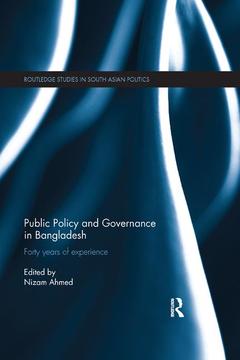Public Policy and Governance in Bangladesh Forty Years of Experience Routledge Studies in South Asian Politics Series
Coordonnateur : Ahmed Nizam

Good policies are an important prerequisite of good governance, and any effort to change one is likely to affect the other. In emerging democracies, such as Bangladesh, a redefinition of roles and responsibilities of different actors in the policy and governing process can be noticed.
This book identifies and analyses issues related to the making and implementation of public policies in Bangladesh over the last four decades (1972-2012). It explores the implications of the change that has taken place in policy and governance environment in Bangladesh. Focusing on several important sectoral and sub-sectoral polices, it examines the impact and limitations of the change.
Chapters are structured into four parts: Public Policy, Bureaucracy and Parliament; Cases of Public Policy; Women in Governance and Public Administration; Ethics, Innovations, and Public Service Delivery, and the book is a valuable resource for researchers in the field of development studies, public policy and South Asian politics.
Part One: Introduction
1. Introduction
Part Two: Governance, Public Policy and Parliament
2. The ‘holy grail’ of governance: Drivers, challenges and opportunities for developing countries
3. Bureaucratic capacity and the quality of government
4. Public management in developing countries: Towards a new synthesis
5. Parliament and public legislation in Bangladesh
Part Three: Cases of Public Policy
6. Agenda shaping and accountability in public policies: An analysis of the food policy of Bangladesh
7. Ambitious plans, cautious implementation: Why has Bangladesh followed such half-hearted privatization policy?
8. External inducement, internal support: Explaining the health-sector policy gains in Bangladesh
9. Revisiting national forest policies in Bangladesh
Part Four: Women in Governance and Public Administration
10. Gender quotas and women’s representation in parliament: Lessons from Bangladesh
11. Openings and resistances: Women in Bangladesh civil service
12. Women’s participation in politics at the local level in Bangladesh: A perspective from good governance
Part Five: Ethics, Innovation, and Public Service Delivery
13. Building an effective ethics infrastructure in the public service of Bangladesh
14. Road to e-governance and public service delivery in Bangladesh: How long is the journey?
15. Citizen’s charter and public service delivery in Bangladesh
16. Governance of NGOs in Bangladesh: Control mechanisms and their limitations
Nizam Ahmed is Professor of Public Administration at the University of Chittagong, Bangladesh.
Date de parution : 12-2019
15.6x23.4 cm
Date de parution : 06-2016
15.6x23.4 cm
Thème de Public Policy and Governance in Bangladesh :
Mots-clés :
reserved; seat; service; delivery; administration; civil; national; forest; policies; Uncertainty Avoidance; ethics; Transparency International Bangladesh; TIB; Public Administration; Politics Administration Dichotomy; PARC; Ethics Infrastructure; Deg; Bangladesh Parliament; E-service Provision; National Forest Policies; Reserved Seats; Socio-economic Development; Eighth Parliament; Seventh Parliament; Ninth Parliament; Elected Women Members; Project Implementation Committees; External Inducement; ICRG Data; NGO Governance; Cc Program; Bureaucratic Capacity; Private Sector Development; Bangladesh Civil Service



